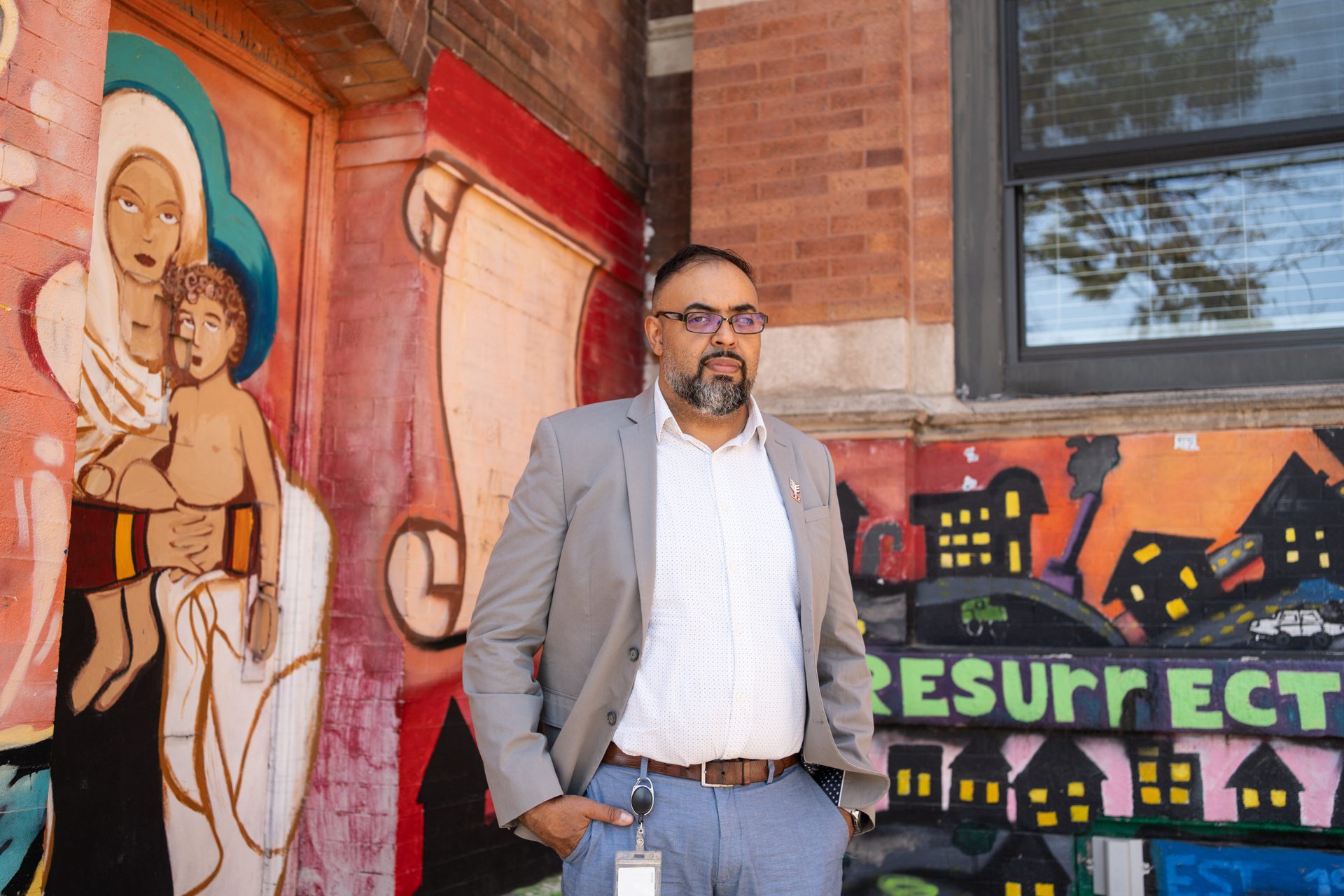 Max Herman/Borderless Magazine
Max Herman/Borderless MagazineGerardo Revelo helped his parents navigate the homeownership process when he was younger. He now guides hundreds of families on the home-buying journey.
For decades, the Resurrection Project (TRP), a community-based nonprofit in Pilsen, has been educating and uplifting Chicago’s immigrant families.
The nonprofit has worked to improve families’ lives socially and economically through a variety of programs spanning affordable housing, immigration services, and financial literacy.
Gerardo Ravelo currently serves as the home purchase and financial empowerment program manager at the Resurrection Project. He specializes in educating and counseling families throughout the homeownership process.
News that puts power under the spotlight and communities at the center.
Sign up for our free newsletter and get updates twice a week.
Ravelo, the son of Mexican immigrants, helped his parents understand the challenges in the housing market from a young age. Over the course of his career, Ravelo has guided more than 600 families through the process of buying a home. At the Resurrection Project, he provides families with tools and resources, such as financial wellness workshops.
Borderless Magazine spoke to Ravelo about his background, his current role, and how the nonprofit helps families achieve their dreams of homeownership.
My parents are immigrants from Mexico who came to the United States more than 30 years ago. I am the middle child of three, and I am the only one of my siblings who graduated from college.
One of the things that really got me into the not-for-profit space was when my parents were actually in the process of buying a home; I saw all the challenges. As children of immigrants, we tend to become the secretaries or the go-to person.
I still face the same challenges regarding terminology, process, and language barriers, but they were especially noticeable in 2005. Seeing those significant barriers motivated me to enter the nonprofit space.
I have been at the Resurrection Project for about three years. We have a program that establishes financial literacy. Our financial team assists individuals with establishing budgets, building credit, building savings and changing habits so they can build on their finances.
We also have the home purchasing program, which provides assistance with navigating how to buy a home. The team helps families who are homeowners with everything from tax appeals to escrow analysis to foreclosure prevention to home repairs.
We also work to help families navigate the complexities of buying a home. One of the biggest challenges is the lack of access to capital, and if they do have access to capital, the homes are really expensive.

When a family whose long-term goal is to purchase a home has no credit, unstable income, and limited savings, we try to work with them to build a strong foundation.
Our financial empowerment team pulls the credit report— the same credit report that any lender pulls, but because we’re not a financial institution, it will not impact your credit. Our counselors have the training and expertise to review, analyze and explain the credit report to our clients so they understand.
We meet people where they are and explain it in a way they can understand what credit score is and how to navigate it. Our home purchase team will analyze where they are and then they will determine what they can afford in the housing market.
The Resurrection Project is one of the few nonprofits that is also a Community Development Financial Institution, CDFI. We also have realtors on staff. The difference between a traditional realtor and our realtors is that our realtors are not commission-based. Any commission the Resurrection Project receives is put back into the homeownership program, so we can continue to provide the services.
When I was a counselor, I often walked families through the process. The conversations varied depending on how close clients were to being mortgage-ready at the time of the session.
If the client has credit challenges, the conversation will go towards rebuilding credit and thinking long-term. If the client only requires increasing savings or reducing credit debt, the conversation will be toward mid-term, up to six months ahead. If the client is considered ready at the time of the appointment and is ready to obtain pre-approval, then the conversation will be short-term, looking three to six months ahead.
Read More of Our Coverage
I hope families take away the importance of reaching out to a nonprofit and getting educated to really understand the homeownership process. I remind every client that they are building their own team to help them purchase a house. Every single player on that team has a financial interest in the transaction, except for your housing counselor. They don’t get a commission. The housing counselor is not dependent on that purchase, so they have a client’s best interests in mind.
One of the things we really emphasize is that we’re not just a typical or traditional nonprofit that finishes the process once you purchase. We go above and beyond. That’s why we designed our housing stability program to provide those additional services and continue to have that relationship with the families after a home is purchased.
For us, there’s always assistance that we can provide and there’s always different knowledge. Education just doesn’t finish there. We continue to educate. Perhaps, there’s a product or program that they now qualify for that they didn’t know was available. For example, if they want to sell their home and upgrade and purchase a new home, we have members to assist them in navigating that process.
We often tell clients that if they have a goal but no plan, they have a dream. We work with them to develop a plan to achieve that dream.
As someone who is first generation and has seen firsthand all the struggles, I wanted to be in a position to help my community. My people. I’ve seen many immigrants being taken advantage of, and I want to try, even on a small scale, to help them as much as I can.
The impact of our work is priceless for families. Being in a not-for-profit is not for everyone. You can easily burn out, but the sense of accomplishment is really rewarding, especially when you see those families who probably never thought they would be able to become homeowners. That generational wealth they’re building is not just for them but for their families and future generations. That keeps me going.
This content was made possible by a grant from The Chicago Community Trust.


